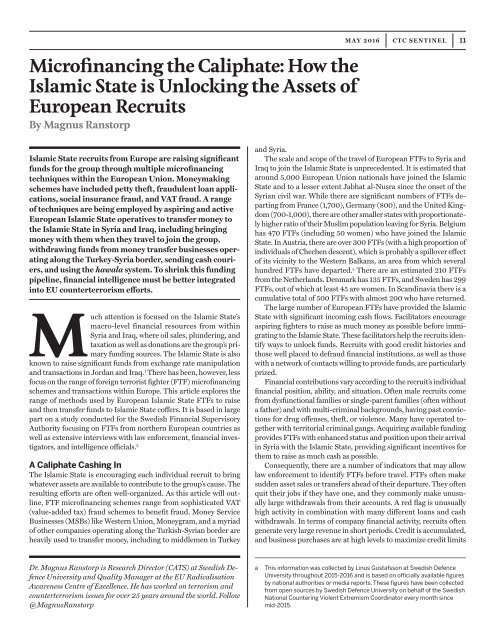The Challenges of Explosive Detection
CTC-SENTINEL_Vol9Iss58
CTC-SENTINEL_Vol9Iss58
You also want an ePaper? Increase the reach of your titles
YUMPU automatically turns print PDFs into web optimized ePapers that Google loves.
Micr<strong>of</strong>inancing the Caliphate: How the<br />
Islamic State is Unlocking the Assets <strong>of</strong><br />
European Recruits<br />
By Magnus Ranstorp<br />
MAY 2016 CTC SENTINEL 11<br />
Islamic State recruits from Europe are raising significant<br />
funds for the group through multiple micr<strong>of</strong>inancing<br />
techniques within the European Union. Moneymaking<br />
schemes have included petty theft, fraudulent loan applications,<br />
social insurance fraud, and VAT fraud. A range<br />
<strong>of</strong> techniques are being employed by aspiring and active<br />
European Islamic State operatives to transfer money to<br />
the Islamic State in Syria and Iraq, including bringing<br />
money with them when they travel to join the group,<br />
withdrawing funds from money transfer businesses operating<br />
along the Turkey-Syria border, sending cash couriers,<br />
and using the hawala system. To shrink this funding<br />
pipeline, financial intelligence must be better integrated<br />
into EU counterterrorism efforts.<br />
Much attention is focused on the Islamic State’s<br />
macro-level financial resources from within<br />
Syria and Iraq, where oil sales, plundering, and<br />
taxation as well as donations are the group’s primary<br />
funding sources. <strong>The</strong> Islamic State is also<br />
known to raise significant funds from exchange rate manipulation<br />
and transactions in Jordan and Iraq. 1 <strong>The</strong>re has been, however, less<br />
focus on the range <strong>of</strong> foreign terrorist fighter (FTF) micr<strong>of</strong>inancing<br />
schemes and transactions within Europe. This article explores the<br />
range <strong>of</strong> methods used by European Islamic State FTFs to raise<br />
and then transfer funds to Islamic State c<strong>of</strong>fers. It is based in large<br />
part on a study conducted for the Swedish Financial Supervisory<br />
Authority focusing on FTFs from northern European countries as<br />
well as extensive interviews with law enforcement, financial investigators,<br />
and intelligence <strong>of</strong>ficials. 2<br />
A Caliphate Cashing In<br />
<strong>The</strong> Islamic State is encouraging each individual recruit to bring<br />
whatever assets are available to contribute to the group’s cause. <strong>The</strong><br />
resulting efforts are <strong>of</strong>ten well-organized. As this article will outline,<br />
FTF micr<strong>of</strong>inancing schemes range from sophisticated VAT<br />
(value-added tax) fraud schemes to benefit fraud. Money Service<br />
Businesses (MSBs) like Western Union, Moneygram, and a myriad<br />
<strong>of</strong> other companies operating along the Turkish-Syrian border are<br />
heavily used to transfer money, including to middlemen in Turkey<br />
and Syria.<br />
<strong>The</strong> scale and scope <strong>of</strong> the travel <strong>of</strong> European FTFs to Syria and<br />
Iraq to join the Islamic State is unprecedented. It is estimated that<br />
around 5,000 European Union nationals have joined the Islamic<br />
State and to a lesser extent Jabhat al-Nusra since the onset <strong>of</strong> the<br />
Syrian civil war. While there are significant numbers <strong>of</strong> FTFs departing<br />
from France (1,700), Germany (800), and the United Kingdom<br />
(700-1,000), there are other smaller states with proportionately<br />
higher ratio <strong>of</strong> their Muslim population leaving for Syria. Belgium<br />
has 470 FTFs (including 50 women) who have joined the Islamic<br />
State. In Austria, there are over 300 FTFs (with a high proportion <strong>of</strong><br />
individuals <strong>of</strong> Chechen descent), which is probably a spillover effect<br />
<strong>of</strong> its vicinity to the Western Balkans, an area from which several<br />
hundred FTFs have departed. a <strong>The</strong>re are an estimated 210 FTFs<br />
from the Netherlands. Denmark has 135 FTFs, and Sweden has 299<br />
FTFs, out <strong>of</strong> which at least 45 are women. In Scandinavia there is a<br />
cumulative total <strong>of</strong> 500 FTFs with almost 200 who have returned.<br />
<strong>The</strong> large number <strong>of</strong> European FTFs have provided the Islamic<br />
State with significant incoming cash flows. Facilitators encourage<br />
aspiring fighters to raise as much money as possible before immigrating<br />
to the Islamic State. <strong>The</strong>se facilitators help the recruits identify<br />
ways to unlock funds. Recruits with good credit histories and<br />
those well placed to defraud financial institutions, as well as those<br />
with a network <strong>of</strong> contacts willing to provide funds, are particularly<br />
prized.<br />
Financial contributions vary according to the recruit’s individual<br />
financial position, ability, and situation. Often male recruits come<br />
from dysfunctional families or single-parent families (<strong>of</strong>ten without<br />
a father) and with multi-criminal backgrounds, having past convictions<br />
for drug <strong>of</strong>fenses, theft, or violence. Many have operated together<br />
with territorial criminal gangs. Acquiring available funding<br />
provides FTFs with enhanced status and position upon their arrival<br />
in Syria with the Islamic State, providing significant incentives for<br />
them to raise as much cash as possible.<br />
Consequently, there are a number <strong>of</strong> indicators that may allow<br />
law enforcement to identify FTFs before travel. FTFs <strong>of</strong>ten make<br />
sudden asset sales or transfers ahead <strong>of</strong> their departure. <strong>The</strong>y <strong>of</strong>ten<br />
quit their jobs if they have one, and they commonly make unusually<br />
large withdrawals from their accounts. A red flag is unusually<br />
high activity in combination with many different loans and cash<br />
withdrawals. In terms <strong>of</strong> company financial activity, recruits <strong>of</strong>ten<br />
generate very large revenue in short periods. Credit is accumulated,<br />
and business purchases are at high levels to maximize credit limits<br />
Dr. Magnus Ranstorp is Research Director (CATS) at Swedish Defence<br />
University and Quality Manager at the EU Radicalisation<br />
Awareness Centre <strong>of</strong> Excellence. He has worked on terrorism and<br />
counterterrorism issues for over 25 years around the world. Follow<br />
@MagnusRanstorp<br />
a<br />
This information was collected by Linus Gustafsson at Swedish Defence<br />
University throughout 2015-2016 and is based on <strong>of</strong>ficially available figures<br />
by national authorities or media reports. <strong>The</strong>se figures have been collected<br />
from open sources by Swedish Defence University on behalf <strong>of</strong> the Swedish<br />
National Countering Violent Extremism Coordinator every month since<br />
mid-2015.


